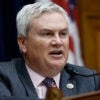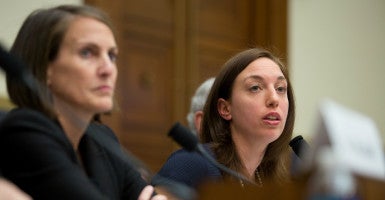Republican congressmen say the Obama administration misled the American people to believe that the debt limit has to be raised to accommodate more government spending because breaching it would result in a calamitous default.
“Our nation’s creditworthiness should not be hindered by the administration’s lack of trustworthiness,” Rep. Sean Duffy, R-Wis., chairman of the House Financial Services Subcommittee on Oversight and Investigations, said during a hearing by his panel.
The debt limit is the amount of money the federal government is authorized to borrow to meet existing legal obligations, according to the U.S. Department of Treasury.
Subpoenaed documents obtained by Duffy’s subcommittee reportedly reveal that the Obama administration developed contingency plans to avoid default by funding key government obligations in the event talks on increasing the debt limit failed.
Administration officials previously said such proposals to prioritize were beyond the capabilities of the Treasury Department.
“We now know from documents that were recently uncovered by this committee that this was a deliberate and calculated lie told to increase political pressure on Congress,” Rep. Tom McClintock, R-Calif, said Tuesday during the hearing, entitled “Unsustainable Federal Spending and the Debt Limit.”
On Treasury’s ability to prioritize debt payments, Daniel Mitchell, a senior fellow specializing in fiscal policy at Cato Institute, testified: “Tens of millions of dollars of additional interest costs resulted from the administration’s lack of forthcomingness.”
McClintock has proposed the Default Prevention Act, legislation requiring the Treasury Department to continue making payments on principal and interest if government spending exceeds the debt limit.
Romina Boccia, a budget expert who is deputy director of the Thomas A. Roe Institute for Economic Policy Studies at The Heritage Foundation, testified that the debt limit “presents a game of chicken” in which it is in the Obama administration’s political interest not to reveal critical information.
Boccia, also Heritage’s Grover M. Hermann research fellow, said:
Absent presidential and congressional leadership through the regular budget process, the debt limit is a key action-forcing tool that drives attention toward our nation’s precarious fiscal state and enables lawmakers to leverage a potential crisis scenario for necessary and urgent policy reforms that might not otherwise come about.
“The debt limit encourages reckless brinkmanship,” Chad Stone, chief economist for the Center on Budget and Policy Priorities, testified.
Arguing that failed negotiations can have a significant effect on confidence in the economy, he added: “As a bargaining chip, I view the risks [as] much too high.”
Stone said debt prioritization would allow the federal government to “meet some of its obligations, but in a protracted situation you would not be meeting other obligations, and that doesn’t inspire confidence.”
Rep. French Hill, R-Ark., asked Boccia and the three other testifying experts which of them supported the existence of the debt limit and the debates inspired by the threat of exceeding it. Only Stone did not raise his hand.
“Any plausible amount of spending to meet society’s needs is sustainable if there are sufficient revenues to avoid large deficits,” he said.
Cato’s Mitchell demurred.
“Our nation faces very serious long-run fiscal challenges, thanks to changing demographics and poorly designed entitlement programs,” he said.
“Red ink is the symptom; excessive government spending is the problem.”






























